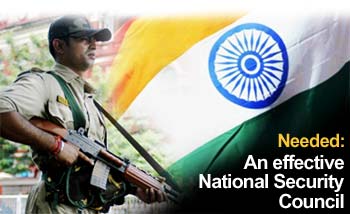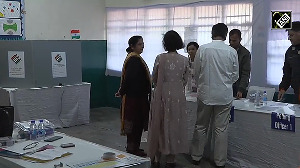
V Balachandran, one of the most respected intelligence officials in the country, assesses the national security challenges confronting the Manmohan Singh government in a three-part series exclusive to rediff.com
Part I: The Domestic Challenge
Chapter III on 'Intelligence Apparatus' in the open version of the National Democratic Alliance Group of Ministers' recommendations titled 'Reforming National Security System' based on the Saxena Task Force report is blank, having been excised on security considerations, despite the entire exercise being the first-ever comprehensive security review since Independence.
Hence one has to guess its contents through media leaks. Comparisons are sometimes inappropriate, but one cannot but cite another monumental study in 1996 on the same subject in the US by the Congressionally mandated committee headed by Harold Brown (former defence secretary under President Jimmy Carter) on the 'Role of US Intelligence in the 21st Century' which insisted on releasing a detailed public version giving the charter of all US agencies with recommendations for better utilisation.
Unlike the Indian task force on intelligence whose consultations were kept under wraps, the Brown committee interviewed 214 individuals of whom 22 were academics like Samuel Huntington, 25 from the corporate sector like the CEO of Sony and media personalities like Bob Woodward. After all, American businessman Ferdinand Eberstadt's 1945 study served as the working paper for the establishment of the National Security Council and CIA!
Also Read: B Raman on National Security and the new government
Intelligence and the National Security Council are closely entwined. The NDA government created a National Security Council but made it dysfunctional with a part time National Security Advisor. Consequently the NSC could not take a leadership role prior to or during Kargil crisis. We are seeing the results of its abdication even now in the form of the army-air force war of words over the use of air power. The NSC met one month after the incursion was noticed. It could not do a strategic 'intelligence arbitration' on the pointers already with government agencies.
Why do we need intelligence arbitration? Intelligence agencies often receive information in a haphazard manner, in bits and pieces, revealing not the full picture on short term events. Agencies sometimes withhold information from dissemination till a fuller picture emerges, as they do not want to be told that they have caused a panic by releasing unverified information.
On several occasions agencies produce varied, incomplete or even conflicting intelligence on security related subjects needing an able arbiter to sort out differences and set in motion further collection to obtain a fuller picture for decision makers. This is 'Intelligence Arbitration.' A further role of the arbitrator is to ensure follow up action and performance review.
Thus, unprocessed security intelligence (battle or tactical intelligence) becomes policy for action only after an alchemic process of 1. collation, 2. analysis by the originator himself if possible, 3. dissemination to the concerned, 4. arbitration by the intelligence coordinator outside the agency, i e, the NSC for a strategic assessment, 5. policy adjudication by the NSC and 6. decision making by the Cabinet.
Any inter space in this process will lead to a situation in which intelligence, including technical pointers already available in some form with any wing of government does not result in policy or action. This leads to an impression of 'Intelligence Failure.'
This is exactly what happened in Kargil. The process of intelligence went through the first two or three stages and stopped at that. There were no 4th, 5th or 6th stages. The Kargil Review Committee mistakenly called this an 'Intelligence Failure' or lack of coordination whereas it was a failure at the NSC level which should have deliberated upon the intelligence from the army, Research and Analysis Wing, and Intelligence Bureau to arrive at a bigger picture.
It is not known what Saxena Committee had recommended as intelligence reforms but Frontline dated May 9, 2003 lamented that many of the recommendations were not implemented even two years after submission of the report as funds were not released for the proper functioning of the Multi-Agency Centre to provide the Intelligence Bureau and internal security organisations the ability to collate and analyse intelligence from field agents. This would be something like the CIA's Counter Terrorism Center which is now replaced by a 'Terrorism Integration Center' under joint CIA-FBI management.
Also, similar funding problems delayed the commencement of the Joint Task Force on Intelligence which was supposed to liaise with the state intelligence and crime branches to allow a free flow of information on terrorism.
The cutting edge of anti-terrorist work including terrorist financing is often the state police who do not normally have the means to know transnational developments or even inter-state events unless central agencies like RAW or IB informs them. Unless there is prompt flow of information they would be handicapped.
It would be useful to study the results of some of the ongoing open enquiries in the US on the alleged intelligence failure leading to 9/11 to draw lessons for us. By now it is amply clear that both the CIA and FBI had some indications regarding Al Qaeda's presence and activities in the US although they might not have had the intelligence on the exact manner they would be targeting that country.
The independent commission investigating 9/11, in its interim report on April 14, 2004, found fault with the CIA for ignoring certain pointers, especially a report in August 2001 on Al Qaeda 'learning to fly.' The same commission on April 13 came down heavily on the FBI with its chairman Thomas Kean saying, 'It (the FBI)failed and it failed and it failed and it failed.'
Who was at fault? Till 2001 the three-layered Inter-Agency Groups of the US National Security Council used to effectively perform the function of intelligence arbitration in tasking different intelligence agencies for further inputs on incomplete assessments before the matter was put to the main NSC chaired by the president for policy.
Unfortunately President Bush abolished these inter-agency groups in February 2001 and set up 11 'policy coordinating committees' with overlapping jurisdiction. At least three committees have jurisdiction over terrorism, with none to do the crucial job of intelligence arbitration.
Even earlier the American government and intelligence agencies had a certain mindset after winning the Cold War. They knew that terrorism was raging elsewhere but thought that their mainland would not be targeted. As a result the government drastically cut down their intelligence agencies.
As early as December 6, 1999 that intrepid journalist Seymour Hersh reported the decay of American intelligence in his piece 'The Intelligence Gap' in the New Yorker, mentioning that the National Security Agency which eavesdrops all over the world had shut 20 of its 42 listening posts and cut 20,000 staff. In another piece 'What went wrong' on October 6, 2001 he said the CIA's Counter Terrorism Center set up in 1986 after a wave of international bombing and supposed to be a 'Fusion Center' to represent all concerned departments fighting terrorism, had become a routine 'paper shuffling unit.'
More or less the same happened in the case of the Rajiv Gandhi assassination when technical pointers already available with RAW and IB were not processed into actionable intelligence to prevent the ghastly tragedy. Like any big bureaucracy, the Indian intelligence agencies were lulled into a belief that all was well as long as the machinery for collection of technical intelligence was functioning.
The moral of the story is quite clear. The National Security Council, which was set up to oversee and guarantee national security, has to be made effective. This can be done only if it is vested with full powers of intelligence oversight, coordination, arbitration, implementation and performance review to ensure accountability.
V Balachandran retired as former special secretary, Cabinet Secretariat, Government of India Part III: National Security: External Challenges Image: Uttam Ghosh






 © 2025
© 2025